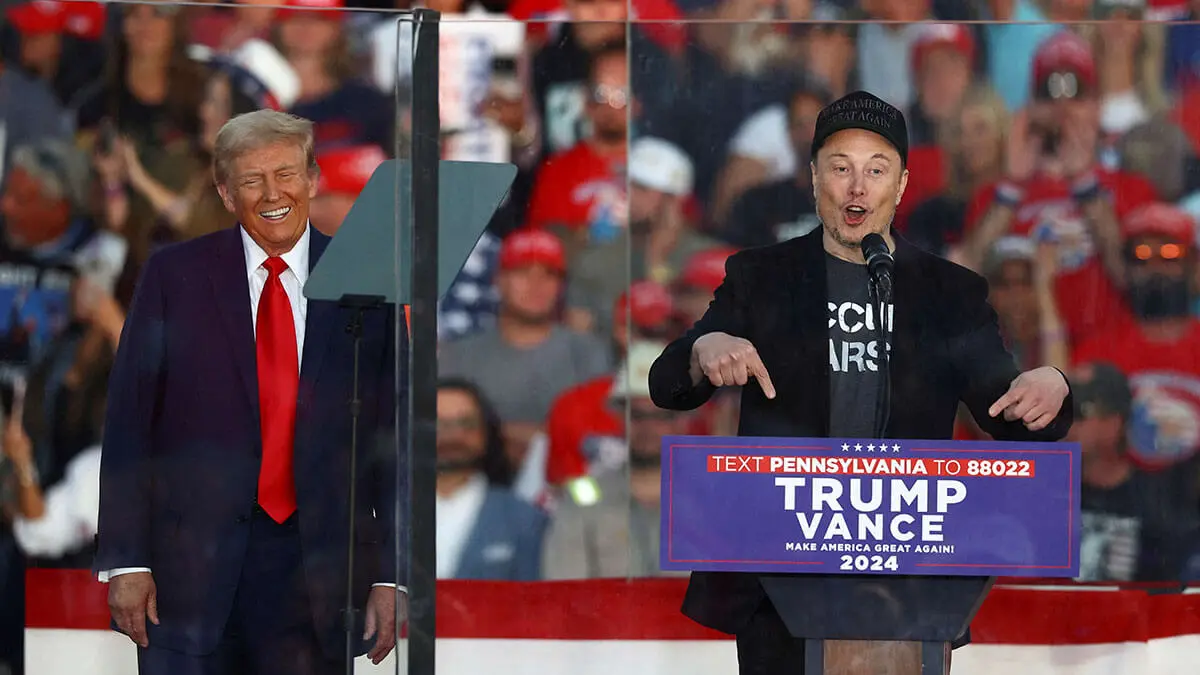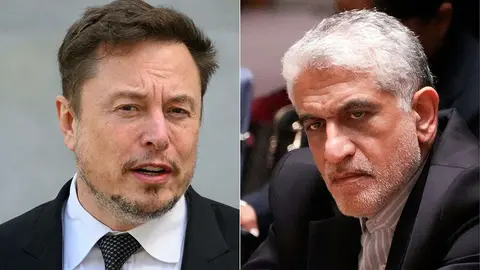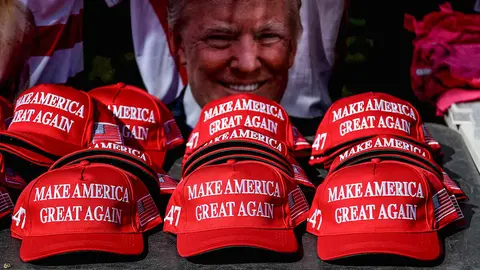Elon Trump or Donald Musk: who is the adult in the room?

- Trump's victory: chronicles of a re-election foretold
- What lies ahead
- Trump's economic model
- How long will the honeymoon between the two last, and geopolitically?
In the course of this year, he added, elections will be held in more than seventy countries around the world where four billion citizens will be called upon to choose their top leaders. Well, we are off to a good start.
Trump's victory: chronicles of a re-election foretold
There is no doubt that Trump has had not only the votes of the electoral college, but the plebiscite of the majority of American voters. Even the new occupant of the White House himself was surprised by such a surge and landslide.
Instead of analysing why such a feat was achieved, let us focus instead on the reasons for the defeat of the Democratic Party. Trump's victory was a foregone conclusion, as the joke about the cloistered monks' convent goes. Among these reasons, we cite:
- Joe Biden's repeated gaffes for reasons of physical and mental health, the latest just days before the elections.
- The limited time Kamala Harris was given to run a proper election campaign. Trying to make up for the lack of time with attacks on Trump's person has further reinforced the image of victimhood that the latter was able to sell with verve.
- Concentrating on abortion rights and turning a deaf ear to social groans. The same causes always produce the same effects. The support for candidate Harris by the ‘bling bling’ people of the film and music world has only radicalised this anger.
- Underestimating the importance of religious and family values for Latino, black, Asian and Arab minorities. The combination of economic and moral registers explains Harris's resounding failure in Atlanta, Martin Luther King's hometown, which is 50% black.
- Disengaging from the issue of immigration and security in a context of declining purchasing power and rapid changes in the world of work. These two issues alone made the far right win in several European countries.
- The ‘laisser faire’ stance towards Netanyahu's government, which has driven away young people, all those involved in ‘Wokism’, and Arab and Muslim voters.
- The withdrawal of support for the Democratic camp by major news organisations such as the Washington Post and the New York Times, in the face of a massive involvement of Elon Musk's X platform.
What lies ahead
Today, Trump is a different man, with more statesmanship and a free hand to do as he pleases. He will not be able to run again and will be 82 years old when this term ends. He has control of the Republican Party, of both houses, of the Supreme Court, and even of defence and security thanks to the umbilical links of these two institutions with Musk. This is unprecedented in US political history.
Four thousand people who make no secret of their conservatism will occupy key positions in the new administration. They share a conspiratorial view of history, espouse economic protectionism and have a pernicious conception of national identity.
Among the more bizarre characters who will occupy important posts in this new era of ‘Zelenskisation’ of American politics are Steven Witkoff, a real estate developer as special envoy to the Middle East, an anti-vaccine lawyer, F. Kennedy Jr., who will probably occupy the Health portfolio despite having no degree in medicine or public health, and Pete Hegseth, a Fox News host and veteran of Iraq and Afghanistan whose nomination as Secretary of Defense came as a bombshell in the Pentagon.
The nomination of Tom Homan, the ideologue of the ‘zero tolerance’ policy, to carry out the operation to expel illegal immigrants, and the return of Ratcliffe to the CIA Directorate seem rather logical. The latter had held the same post in Trump's first term and shares the new president's particular fixation on China.
As for the two billionaires Elon Musk and Vivek Ramaswamy, their mission between now and 4 July 2026 is to reduce state spending. This is what is apparent. However, the entity they will lead called ‘government efficiency’ is not part of the Administration, it is rather a kind of ‘think tank’, it is not known how it will be financed, and the most likely scenario is that it will put into practice the neo-reactionary vision critical of liberal democracy, which they see as a weapon used by the progressive elites to impose a universalist culture on the world that only generates conflict and chaos to serve their interests.
The conceptual foundations of this movement called ‘dark lights’, ‘dark enlightenment’ or ‘neoreaction’ (NRx) to which the Silicon Valley tycoons adhere are inspired by the theses of James Burnham, who advocates a new libertarian technocratic reign. For them, the state serves only to create obstacles and should therefore be dismantled and replaced by another, floating and almost ethereal state. Vice President J. D. Vance is a fervent advocate of this trend. With Musk on the farm, they will be tearing down the current administrative-media-university system, which they call ‘the cathedral’, and destroying the deep state, which they say does not allow for any possibility of change. Just as the interest of the military-industrial complex, they add, is to stir up conflicts and wars in order to produce and sell weapons, the interest of the ‘cathedral’ is to increase socio-economic problems in order to generate more expert reports, societal debates, international conferences, research credits and regulations.
In short, the ultimate goal is to turn the citizen into a utilitarian and make him maximise his investments.
With such aims and an administration without competence where loyalty to the president is paramount, there are two essential risks: first, working outside the norms of American democracy, and second, confusing bureaucracy and public services. This is a likely first sticking point between Trump and Musk: how far will the latter's interests conflict with the former's responsibilities?
Trump's economic model
Roughly speaking, it rests on two pillars: fracking and tariffs. With the former, i.e. ‘drill baby drill’ (with its sexual connotation so dear to Trump's heart), the US's exit from agreements to try to reduce climate change is further consolidated; with the latter, the abandonment of the foundations of free trade and the enshrinement of economic protectionism. Against China, his real obsession, he is most likely to apply customs duties, sanctions and ban technology transfer. Here is another point of disagreement between Trump and Musk. While the former wants to corner China economically, the latter has the Gigafactory 3 for lithium-ion batteries and electric cars there since 2019. Betting on hydraulic fracturing means sticking with thermal engines, while Tesla has been investing in electric cars for many years.
How long will the honeymoon between the two last, and geopolitically?
There is no doubt that the basic concept that will govern US geopolitical relations is ‘America first’. Protectionist policies in defence, technology and energy are the order of the day.
As for US involvement in foreign conflicts, although Trump promised in his election campaign to limit it, he will continue to use deterrent and punitive force against countries such as China and Iran to prohibit the former from achieving economic supremacy and the latter from pursuing its nuclear project, limiting its missile attack capacity and striking at armed organisations proxying for it.
As far as the Russian-Ukrainian war is concerned, Vice-President J. D. Vance had outlined Trump's plan to resolve it. It consists of three phases: first, bringing the leaders of the two belligerent countries together with those of the EU to agree on the need to stop the war; second, for Russia to keep the land it occupied and disarm the new borders; and third, for Ukraine to promise not to join NATO in exchange for security guarantees to prohibit a new Russian invasion. Such a scenario does not seem feasible because of the unknowns over such guarantees and how to disarm the border. Biden's last-minute authorisation, with the approval of military commanders, to use long-range missiles (up to 300 km) further complicates the situation.
In any case, Trump's eventual success in stopping this war would fulfil two objectives: on the one hand, to make the 56.3 billion dollars that the US has invested in Ukraine since the Russian invasion in February 2022 profitable, thanks to the manna of rebuilding the country's infrastructure and its army, and, on the other, to devote himself body and soul to the Chinese issue that is so distressing to him.
For the Middle East, the nominations of Marco Rubio at Foreign Affairs, Pete Hegset at Defence, Elise Stefanik as UN delegate, Steve Witkoff as Middle East envoy, and Mike Huckabee at the Embassy in Tel Aviv, further strengthen the Zionist wing in the new government known for its unconditional support for the policies of the Israeli far right. As a result, the Abraham Accords will most likely be resumed with the inclusion this time of Saudi Arabia as planned. With the near dismantling of Hamas and Hezbollah, it has an easier time within the complexity of this issue.
As for the European Union, it is at an existential turning point. With 500 million inhabitants compared to 300 million Americans, Trump, not without reason, is calling on it to rely on itself to ensure its own defence. The strong divisions between its two main powers, Germany and France, the unequivocal support of the Poles for the US, and Hungary and Slovakia's strong ties with Russia make agreement on a European defence model almost impossible. This makes it clear that although geography never has the last word, it can be dispensed with. And so Trump will continue to play on these détentes and it is not surprising that he will strike deals with Putin and force Zelensky to accept painful solutions.



